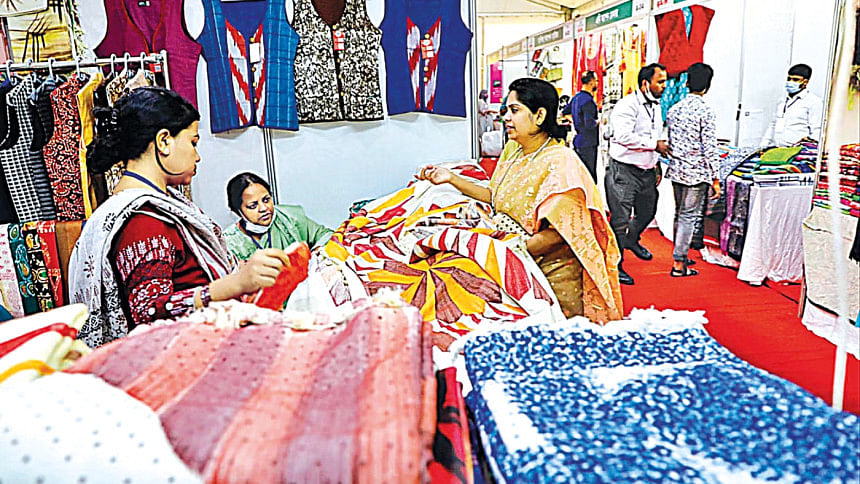Financing her initiatives

Despite growing participation in the economy, women entrepreneurs in Bangladesh continue to face systemic barriers that limit the scale and scope of their business ventures. From limited access to credit to entrenched gender norms, the challenges are both structural and social. Particularly within the cottage, micro, small, and medium enterprise (CMSME) sector, women-led businesses often struggle to secure financing due to lack of collateral and perceived risk.
However, this narrative is gradually shifting. With growing awareness of the need for inclusive growth, banks and financial institutions are increasingly introducing women-centric products tailored to the unique needs of female entrepreneurs—aiming to unlock their economic potential and promote sustainability.
According to the Asia Foundation's Annual Report 2022, 46% of SMEs received loans to expand their businesses, with 91% reporting increased income. Despite success stories where women-driven initiatives significantly contribute to family and national economies, the number of women-led SMEs remains relatively low. While Bangladesh ranks 59th in the World Economic Forum's Gender Gap Index 2023, it stands 139th out of 146 in women's economic participation, reflecting the deep-rooted barriers to financial inclusion and leadership.
"Bangladesh has made progress in gender equality through policies and legislation, but their effectiveness remains limited," said Professor Muhammad Shahadat Hossain Siddiquee, Economics Professor at the University of Dhaka. He suggested creating opportunities for women and fostering a business-friendly environment to encourage more women to venture into entrepreneurship.
Access to formal credit remains a persistent hurdle for MSMEs, largely due to low financial literacy, inadequate credit history, and lack of business expertise. Sangita Ahmed, Senior Vice President of the Bangladesh Women Chamber of Commerce and Industry (BWCCI), highlights another layer of the problem: "Women's contributions often go unrecognised, as many run unregistered businesses without licences or tax records. This makes accessing financing—whether credit or other services—much more difficult. Alarmingly, only 1.7% of women-owned enterprises in Bangladesh are formally registered, far below the global average of 14.5%." She also cites limited mobility, lower access to information, and weak integration into the mainstream supply chain as additional factors that place women entrepreneurs at a disadvantage compared to men.
To address these challenges, several banks have introduced targeted lending products and support programmes aimed at women-led MSMEs. Through their 'EBL Mukti' loan facility, EBL offers financing of up to BDT 1 crore, collateral-free up to BDT 50 lakh, specifically designed to empower female entrepreneurs.

BRAC Bank offers comprehensive banking and financing solutions for women-led CMSMEs through its dedicated women banking proposition, TARA. "We go beyond traditional banking by organising networking events and capacity-building workshops to equip SME owners, especially women, with the skills they need for entrepreneurial success," said Tareq Refat Ullah Khan, Managing Director and CEO (Current Charge) of BRAC Bank.
Highlighting Dhaka Bank's commitment to supporting women-led MSMEs, Sheikh Mohammad Maroof, Managing Director and CEO of Dhaka Bank, said, "Our efforts include a range of financing and capacity-building initiatives designed to empower women entrepreneurs." Among these initiatives is the Oditiya Loan, an EMI-based product tailored to help women-led businesses acquire assets and expand their operations sustainably.
Some banks are offering EMI-based loans to help women acquire assets and scale their businesses sustainably.
Others focus on gender-sensitive policies, such as offering unsecured loans without requiring spousal guarantees, particularly for widows and divorced women—recognising that women's financial independence should not hinge on male family members.
Emphasising the importance of gender-focused lending and expanding access for women entrepreneurs across Bangladesh, Mirza Elias Uddin Ahmed, Managing Director of Jamuna Bank, said, "Women entrepreneurs hold great promise in reshaping our MSME landscape. Jamuna Bank actively promotes financial inclusion for women. As of 2024, we have disbursed BDT 377.99 crore to 1,751 women-led MSMEs, representing 2.8% of our total MSME portfolio." The bank's SME Nari Uddogh programme is specifically designed for women entrepreneurs, offering flexible repayment terms, low processing times, and advisory support to help them thrive.
Describing support for women entrepreneurs as a national imperative, Ahsan Zaman Chowdhury, Managing Director and CEO of Trust Bank, said, "Supporting women entrepreneurs isn't just good business—it's essential for Bangladesh's economic future."
He added, "Our Trust Nondini programme offers substantial unsecured loans of up to BDT 25 lakh. We've specifically designed it to accommodate widows and divorced women without requiring spousal guarantees—recognising that women's financial independence should not be dependent on male relatives."
In 2023, Bangladesh Bank renamed its Small Enterprise Refinance Scheme to the Small Enterprise Refinance Scheme for Women Entrepreneurs, dedicating it exclusively to women. Under this initiative, banks and financial institutions are offered incentive facilities at a rate of 1% to encourage timely loan adjustments, collections, and repayments. The maximum interest rate under the scheme is capped at 5%.
Women in rural areas face greater challenges than those in urban centres across every essential parameter for entrepreneurial growth. "Establishing economic zones for women entrepreneurs and strengthening institutions like BSCIC and the SME Foundation are critical," said Mousumi Islam, President of AGWEB.
Beyond credit, many banks are investing in financial literacy and entrepreneurship development programmes, often in collaboration with Bangladesh Bank and the SME Foundation. These initiatives aim to enhance managerial, planning, and digital skills among women entrepreneurs, especially in rural and semi-urban areas.
To strengthen financial access, banks have also established dedicated women banking divisions and women entrepreneur desks at branches across the country. These specialised units are staffed with professionals trained to understand the specific challenges faced by women-led CMSMEs.
With a dedicated Women Banking Division and Women Entrepreneur Dedicated Desks (WEDD) across its branches, NCC Bank offers tailored loan and deposit products, along with preferential financing under government-backed refinance and pre-finance schemes at competitive interest rates. "We conduct targeted financial literacy initiatives, such as SME fairs and open credit programmes, to build capacity and foster entrepreneurial growth among underrepresented segments," said M. Khurshed Alam, Additional Managing Director of NCC Bank.
"BRAC Bank's extensive branch network includes specialised SME desks staffed with professionals trained to understand the unique challenges faced by small businesses," added Tareq Refat Ullah Khan, Managing Director and CEO (Current Charge) of BRAC Bank.
Furthermore, partnerships between banks and women-focused business associations are acting as catalysts for change. For example, EBL's agreements with groups like the Bangladesh Women Chamber of Commerce and Industry (BWCCI) and the Chittagong Women Chamber of Commerce and Industry are helping to streamline services and broaden outreach.
"We're also committed to expanding access for youth-led and differently-abled-led enterprises," said M Jamal Uddin, Managing Director and CEO of IDLC Finance, highlighting ongoing efforts to support underserved groups. "As a signatory to the UNEP FI Net Zero Banking Alliance and the Principles for Responsible Banking, we integrate gender inclusion and SDG alignment into our core lending practices." IDLC's women-focused loan product, Purnota, offers not only favourable loan terms but also mentorship and training to empower women entrepreneurs in overcoming systemic barriers.
Ultimately, the banking sector's evolving approach, ranging from capacity building and networking to facilitating market access—is proving that empowering women-led CMSMEs is not just a matter of fairness, but a smart strategy for long-term, inclusive growth.

 For all latest news, follow The Daily Star's Google News channel.
For all latest news, follow The Daily Star's Google News channel. 



Comments